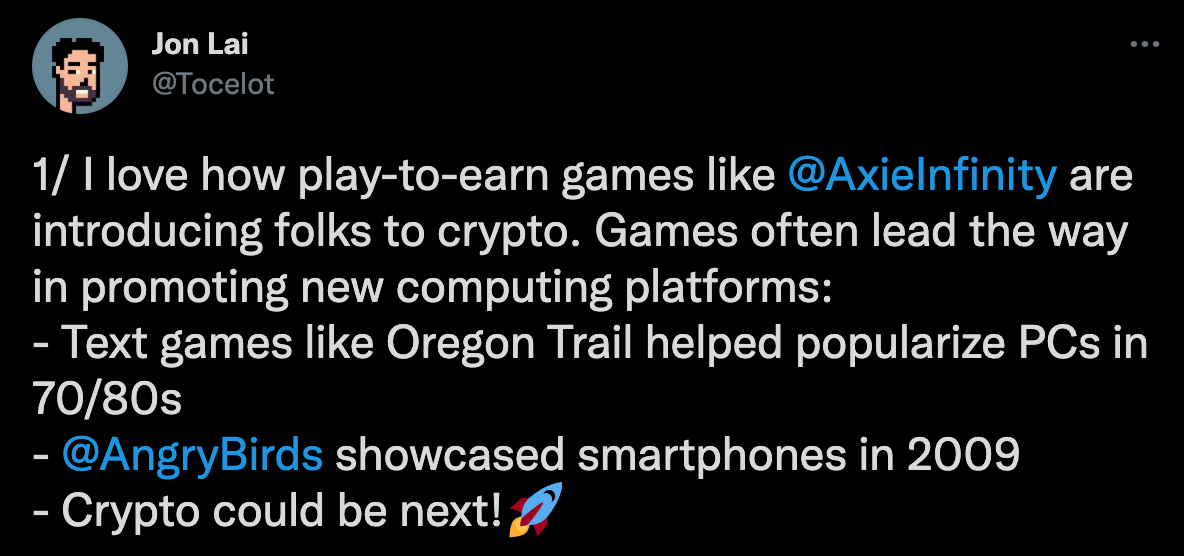Finding Equilibrium #5: Gaming the Future
Gaming, The Metaverse, and Space Manufacturing (~3 Minute Read)
Hello Everyone!
This week’s topic is another in the list of “things Aqil ignored that turned out to be important” and it’s all about gaming. Not just gaming as an industry, but how behaviors in gaming predate what happens in the broader world. Let’s dive in:
Optimizing friction is fundamental to game design. No friction (Ex. press a button and win) is boring; high friction is frustrating. I’d just scratched the surface writing about reintroducing friction last year, but game designers were at it since the 1970s! That’s helped gaming become one of the most prescient indicators of human behavior.
Game designers are constantly testing this engagement-friction balance, which has equipped them with a profound understanding of human behavior. It’s driven their innovative growth, with the industry ballooning to $120B from just $3B in the 1970s. But these patterns have proven to be critical beyond just game engagement. They’re unravelling in our everyday lives, especially in targeted communities and online multiplayer coordination.
Let's start with communities. Social Networks aggregated many people - this was great for broad connection, but not necessarily for depth. So the past few years has seen social networks deconstruct into smaller, interest-driven communities. Facebook champions Facebook Groups, Instagram introduced its close friends feature, and a slew of targeted communities emerged across platforms like Discord and Slack. They're proving to be lucrative too. A Chinese company, Billi Billi, is worth $20B today. But it only admits people if they pass a 60-minute topic test! Another example is SoleSavy, a startup that's amassed thousands of sneakerheads spending $30/month to join its slack community.
These community behaviors feel novel, but gamers have been exhibiting them for decades. Just look at Discord. In 2015, its slogan was "chat for gamers". It was explicitly designed for gamers to create different channels, game, and collaborate. But with targeted communities proliferating, Discord's capitalizing. Their new tagline is "Create space for everyone to find belonging". They’ve fended off a $10B Microsoft acquisition, are now valued at $15B, and have tripled their 2020 revenue to $130M. Even I'm a user now! (And many of you know I have 0 gaming talent). Gaming predated the need for verticalized online communities, and Discord is reaping the benefits.
This deeper connectivity is spurring another emerging trend from gaming: multiplayer mode. Games solved multiplayer right from the Playstation 1. Whether it was playing on the same sporting team or going head-to-head, multiplayer worked like a charm. But when work went digital, it was primarily single-player mode. Tools like Photoshop or Excel were powerful for individuals but lacked collaboration. This made sense given internet connectivity at the time, but now tools like Figma (UX Design), Miro (whiteboarding), or Google Docs have paved the way for real-time collaboration.
Still, most of today's software collaboration is rudimentary compared to multiplayer gaming. Multiplayer gaming has the whole bundle: from collaboration to coordination to reward-sharing. SaaS tools just let people work in a space together. They don't coordinate creation or cover auxiliary elements (sharing rewards, for example). But that's rapidly changing. Tools like Mirror allow writers to collaborate and automatically share proportional rewards through decentralized digital agreements (Smart Contracts). The underlying technology behind this is the blockchain, where rules can be programmatically embedded and enforced. It's just the early days, but these advancements will transform multiplayer work in terms of not only how it's done, but who you work with. Just as we have multiple teams for games, we could have multiple organizations for work. SaaS brought creators together. Blockchain's helping them get paid. But together, they're just replicating what happens in games!
These trends seem to behave in 3 core stages. They begin in gaming, flow into consumer behaviors, and then take over the enterprise. That's happened in connection: gaming communities bred social networks, which spawned enterprise tools like Slack. It's also happening with virtual worlds and remote work. Spatial Interfaces have always been huge in gaming (think walking around in Pokemon) but are now permeating into work through Facebook’s Horizon Workrooms and startups like Gather. Digital Assets are commonplace in gaming, but are now morphing into both consumer and enterprise behaviors as NFTs (verifiably scarce digital assets/collectibles) with even VISA buying a Cryptopunk. All of this leads to an increasingly virtual world, called the metaverse, but still begs the question: what else can games teach us about people?
Startup of the Week
This startup raised $42M to recreate what was going on in Transformers 3. They’re building manufacturing facilities in space(!) for advanced products that benefit from zero-gravity manufacturing. I don’t know a ton about achieving zero gravity, but I bet it’s expensive either way: whether you recreate it on Earth or go into space. But, if Varda finds products where the value add from microgravity manufacturing far exceeds the transportation costs, it could drastically expand what becomes commercially viable. There’s been research into the benefits of manufacturing novel pharmaceuticals and bioprinted organs in space, so they’re starting there with a 2023 goal. Intersecting Biotech and Space never occurred to me before, but Biotech’s high Cost of Sales and corresponding prices may just be ripe for something dramatic like this!
Weekly Finds
On the topic of games, here’s a cool thread on how they’ve historically helped introduce new behaviors. Snake helped people become familiar with cellphone keypads. Angry Birds introduced touchscreen controls like swiping and gesturing. And now, AxieInfinity is teaching people “crypto-native” concepts like tokens, decentralization, and increased individual ownership with it’s prolific growth ($670K in April to $207M in July!) Snake and Angry Birds set the stage for incredible innovation, and it would be awesome to see the same trend unfold over the coming years. History does repeat itself…
If the metaverse mention piqued your interest, Matthew Ball, one of the best tech essayists/investors out there, basically wrote a book on it here: The Metaverse Primer. It’s quite comprehensive and I’m admittedly still working through it, but these two are great places to start: A Framework for the Metaverse | Virtual Platforms and the Metaverse
Thanks for taking the time to read through!
As always, please feel free to hit reply with any feedback or advice - all of your feedback (good and bad!) are a big part of my improving this letter with each issue.
Until next time,
Aqil


